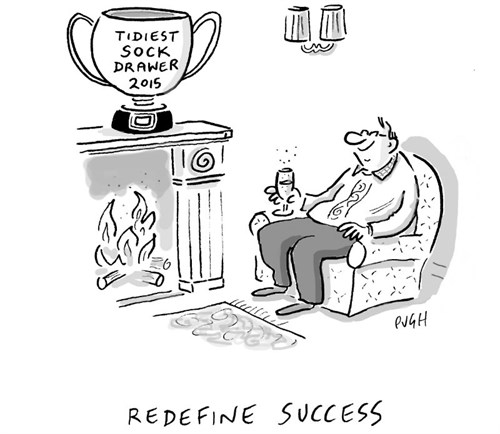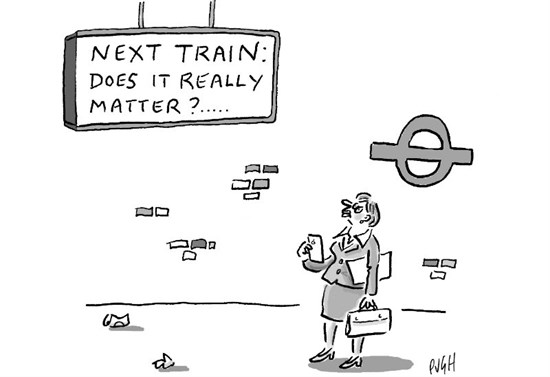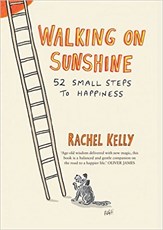Small steps to happiness
10 Nov 2015 | Rachel Kelly

When I came out last year as someone who had suffered
from serious depression, I was often told how brave I was to share
my story.
This worried me. If I was brave, I mused to myself, this implied
I had something to be ashamed of. Would I have been labeled brave
if I had confessed to having diabetes?
The stigma surrounding mental health means that we are still
uncomfortable admitting we've suffered from mental illness. I know
this because I've given many talks on the subject since I became an
Ambassador for the mental health charity SANE, and since
my memoir Black Rainbow: How words healed me - my journey
through depression was published last April. I often ask
audiences if they've been able to be open either in the workplace
or with their families about their own experience of depression.
Most haven't.
The reason, I think, is that those who suffer from depression
feel as if they've failed in some way. And ours is not a culture
that encourages us to be open about perceived failures.
We are embarrassed if we get things wrong. We worry we will be
judged, and mocked. Many public figures, be they politicians,
sportsmen, doctors or actors don't want to be seen as vulnerable or
human. I was amazed recently when I was chatting about my own
experience of mental illness with a high profile BBC presenter. He
had suffered a breakdown too, but had kept very quiet out of fear -
he didn't want this life experience that he had had to impact
negatively on his career.
If we are to truly beat the stigma that surrounds mental
illness, we need to deconstruct the idea that you are only a
success if you live a 'perfect' life free of challenges, pain or
setbacks. We need to adopt something of the positive attitude
towards getting knocked down that is commonplace in America, a land
where they hold workshops, seminars and conferences celebrating the
art of making mistakes. Where they write books entitled Why Success
Always Starts with Failure and have coined the term 'failing up' -
encapsulating the perspective that the obstacles in our way can
also serve as our stepping-stones.

Supposed failure, mistakes and even suffering, however
undesirable, make us who we are. I don't regret having had
depression even though it was horrendous to go through because it
has ultimately shaped my life in a new and positive way.
Thanks to the illness I've had to learn a new way of being, born
of adversity. I now feel calm and well, and sometimes even feel as
if I'm walking on sunshine. Had I not been so ill, I would never
have changed my ways and learnt to live life more consciously and
with greater intention.
I now use a colourful salad bowl of strategies to stay well and
happy. We all know we need to go to the gym to keep fit, but I've
learnt we need to take responsibility for our mental health too.
There are plenty of small steps I now follow which have made me
feel grounded and have simplified my life - and created an
environment in which happiness comes out unexpectedly, as the
wonderful poet Raymond Carver put it.
Many of them involve ancient Buddhist philosophies, now
rebranded in the West as 'mindfulness'. Typically, for example:
before I suffered my first breakdown I was someone who either spent
time regretting the past or worrying about the future, but by using
breathing exercises I've learnt to refocus my attention more on the
present moment and learnt to enjoy it in a new way.

Other strategies have involved changes to my diet as I've
becoming increasingly aware of the links between mind and food. I'm
a great believer in Vitamin D supplements in our normally overcast
climate, as well as the mood-enhancing effects of Vitamin B.
Most fundamentally though, I think, has been a shift in how I
view 'failure'. Now I embrace and revel in it - grateful for each
new lesson and bend in the road.
My own illness has given me a dream - that by sharing some of
the ideas and strategies that have helped me recover in my new
book: Walking on Sunshine: 52 Small Steps to
Happiness, perhaps even one other person might be helped.
I wrote the book in the same time period in which I was
fortunate enough to run poetry workshops for mental health
charities including Mind, SMART and Depression Alliance. In these meetings, I
shared my own steps to recovery and was lucky enough to hear what
was helping others. It was electrifying when week-by-week,
participants reported what was working for them and we were able to
pool together our common insights and goals.
Now, today, I do feel brave. Not for sharing anything that's
shameful, but for facing the wall of silence: putting myself out
there and encouraging others to do the same.


Walking on Sunshine: 52 Small Steps to
Happiness is published by Short Books. For more
information please follow @RachelKellyNet on Twitter or visit www.rachel-kelly.net
The Pugh cartoons (which also feature in Rachel's book) appear
courtesy of the Daily Mail.